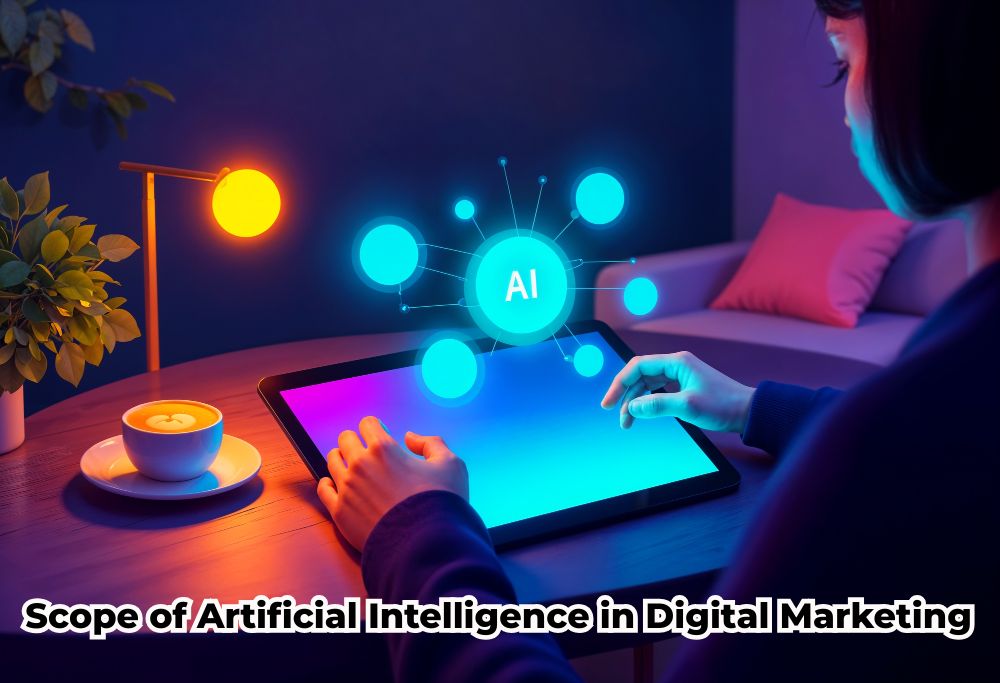AI has been the most talked-about technology and has dominated technological advances in many industries in the past decade, including digital marketing. Today, AI will help companies change their marketing campaign methods to reach their target demographics. Feel free to read if you want to know more about what artificial intelligence technologies do and how they influence and reshape digital marketing and potential opportunities. This article will explore the scope of artificial intelligence in digital marketing.
Scope of Artificial Intelligence in Digital Marketing

Understanding Artificial Intelligence in Digital Marketing
AI in digital marketing means applying artificial intelligence technologies, such as machine learning, natural language processing, data analysis, etc., to digital storage campaigns and everyday operations. Instead of interpreting datasets or developing broad marketing strategies, AI provides marketers with intricate strategies sensitive to specific audiences. There can only be a day with artificial intelligence features, starting with predictive analytics and ending with chatbots and voice search.
AI information processing provides businesses with valuable information about historical tendencies, which can be obtained in a mere instance compared to what typically takes days or weeks. It enables marketers to create and deploy targeted experiences at scale, a feat that most traditional marketing strategies fail to accomplish. This capability is gradually making AI become not just a novelty that organizations can choose to apply in marketing as an extra tool but a necessity.
Benefits of Using AI in Digital Marketing
AI in digital marketing has various advantages, including effectiveness, customer satisfaction, and Return on Investment. A significant strength, therefore, is automation. It can automatically send emails, schedule meetings, or adjust ad placements so marketers can think and create. Furthermore, AI is precise when studying consumers, increasing efficiency in marketing and advertising.
Another advantage is the possibility of using the predictive analysis feature. Similarly, AI can help predict customer trends, meaning businesses can be miles ahead of their competitors. The feature that a salesperson can offer targeted needs fulfillment enhances customer satisfaction and leads to long-term customers.
Applications of AI in Digital Marketing
AI is applied to digital marketing in a wide variety of ways. Among all the possibilities, the most notable is demographic pharmaceutical sales forecasting. Marketers can use it to forecast consumer behavior and trends, analyzing data from prior years. This capability enables organizations to develop superior campaigns to conventional strategies using data.
Chatbots have also enhanced customer support by offering prompt and auto-interactive responses to customers’ questions. Chatbots utilizing artificial intelligence work at all times and can respond to several clients at once, thus saving businesses a lot of money while improving customer satisfaction. These bots are increasing engagement with people and, as a result, enhancing their capacity to choose reactions closer to those of a human.
How Artificial Intelligence is Changing the Face of Content Marketing
Another field that is seeing considerable disruption through AI is content marketing. AI helps in content production by coming up with topic ideas, evaluating performing content, and even developing first drafts. Some AI penning companions allow a person to write blog posts, captions, or promotional texts for advertisements in the shortest time possible while maintaining quality.
Also, it determines users’ behavior with content and how to further campaigns can be improve. AI, like presenting a video on YouTube or recommending specific articles when using a news app, enhances engagement by recommending content the user has once interacted with.
Future of AI in Digital Marketing
AI in digital marketing is an up-and-coming tool, and it only has the potential for growth with the appearance of new technologies. However, one area in particular looks promising for further embedding generative AI technologies for individualization. Such models as GPT from OpenAI enable organizations to develop exceptionally targeted content, conversational, and even product interfaces that change, reflecting the customer requirements in real time.
Yet another area that is quickly becoming popular is voice marketing. Since Siri, Alexa, and Google Assistant are becoming more popular among users, it is critical for companies to adapt content and approaches for voice search. AI will help design conversation interfaces and voice backlinks for reaching such audiences.
Challenges when adopting AI in marketing
While it has its prospects, applying artificial intelligence in the digital marketing space isn’t without limitations. Data privacy is one of the largest barriers to implementing big data initiatives. Any business entity is bound to have legal requirements such as GDPR or CCPA in place, as the management of customer data should be fair.
Yet another challenge relates to the availability of quality data. AI systems require extensive databases, different from the systems’ preprocessing, to help generate the desired conclusions. Companies that lack this data may discover that AI tools are either not beneficial or skewed in their favor.
Conclusion
AI is not a floating terminology in the world of digital marketing; it has become a set of tools that ensure companies’ competitiveness is maintained. The corporations that choose to invest in AI today prepare for the future and aim to be ahead of consumers’ and markets’ expectations. From ‘one-to-one marketing’ to predictive analytics and beyond, AI is vast and poised to revolutionize how marketers work and deliver increasingly practical, creative, and compelling messaging.
Therefore, the challenges mentioned earlier can be overwhelming, though they are not impossible to overcome. Organizations that have ensured they are cautious about these issues and embrace them when getting their benefits will be regarded as leaders in their respective fields.




